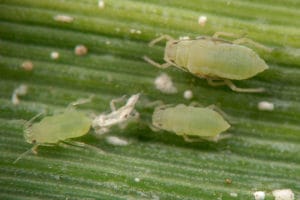Washington State University has received a federal grant of nearly $750,000 to help determine how organic farming practices are defeating some major pests
Seattle Times
By Kristi Pihl
 The DNA from the stomachs of predator bugs and plant genetics may help Washington State University researchers figure out how organic-farming practices are defeating major pests like aphids and caterpillars.
The DNA from the stomachs of predator bugs and plant genetics may help Washington State University researchers figure out how organic-farming practices are defeating major pests like aphids and caterpillars.
WSU recently received an almost $750,000 grant from the U.S. Department of Agriculture’s National Institute of Food and Agriculture that will be the main source of funding for the three-year “CSI: Organic” project.
The inspiration came from interviews researchers at Oregon State University did with farmers who have been growing organic vegetables for more than 20 years, said Bill Snyder, WSU professor of entomology.
Those farmers said some pests such as caterpillars and aphids are no longer a problem with broccoli and related crops, he said.
That’s significant because a survey done by OSU found that the two most important pests for broccoli are caterpillars and aphids, he said.
Pests can be a giant problem for farmers selling on the fresh market, Snyder said. Obviously, it’s bad if pests eat all the broccoli. But even a few visible signs of insects can cause a supermarket to reject the whole lot.
“I’m glad when I see an aphid on something I get because at least I know it’s really organic,” Snyder said.
Snyder said what they find about predator bugs and soil health will be information any farmer can use, whether organic or conventional. And it’s information that could benefit organic growers of other crops.
“We hope that we learn some really general lessons about how to make pests less of a problem,” he said.
Also working on the project are Alex Stone, OSU professor of horticulture; James Harwood, University of Kentucky professor of entomology; and John Reganold, WSU professor in crops and soils.
Organics are still a small part of the overall agricultural industry, Snyder said.
But the value of organic agriculture is rising. The state’s organic crops grew in value by 20 percent from 2010-11, to $284.5 million, according to a study by WSU’s Center for Sustaining Agriculture and Natural Resources. That’s the highest value in seven years.
Eastern Washington counties accounted for about 82 percent of that value. There were about 88,100 organic acres in the state in 2012.
People have thought the reason there are so many pests in agriculture is because farms often focus on one crop and use broad pesticides, Snyder said. Those pesticides can knock out the predatory bugs that otherwise would eat the pests.
Part of the philosophy of growing organically is to use natural processes to control pests instead of broad-acting insecticides, Snyder said. Organic farmers may also increase the biodiversity of their farm by putting a mix of crops in the same area.
By taking advantage of good insects, farmers can avoid spraying pesticides, he said. Some growers have planted flowering plants to help support ladybugs.
It’s possible that farms that have been organic for a long time build up a diverse and abundant population of natural enemies, devouring the aphids and caterpillars, Snyder said.
The natural enemies Snyder and others will look at in this study include ladybugs, spiders and parasitoids such as wasps.
A female wasp will insert her egg into the pest insect, Snyder said. The larvae develops inside the pest and eats its way out. The larvae will start with the nonessential parts like wing muscles and reproductive structures, and then will eat the heart, killing the pest, he said.
Researchers will collect predators from farms participating in the study and then look at the pest DNA collected in the stomachs of the predators, Snyder said. That way, they can track what the predators are eating.
It’s also possible that the plants are so healthy because of things organic farmers do to improve soil health, Snyder said. For example, organic farmers tend to use manure and cover crops.
“Healthy soil equals healthier plants,” he said.
Snyder said researchers will be able to see if the immunity genes of plants grown in long-term organic farming are being expressed more strongly than those same genes in plants grown in newer organic fields.
The first field season for the research project will be this coming year, Snyder said. They are still working to line up growers, with the goal of recruiting 15 farmers who have grown organically for 20 or more years, 15 farmers who have grown organically for no more than three years and 15 conventional farmers.
Farms from Western Washington, Oregon and California will participate in the study, Snyder said. Some Eastern Washington and Idaho farms also might be included. A lot of the organic vegetable production in Washington is west of the Cascades.

